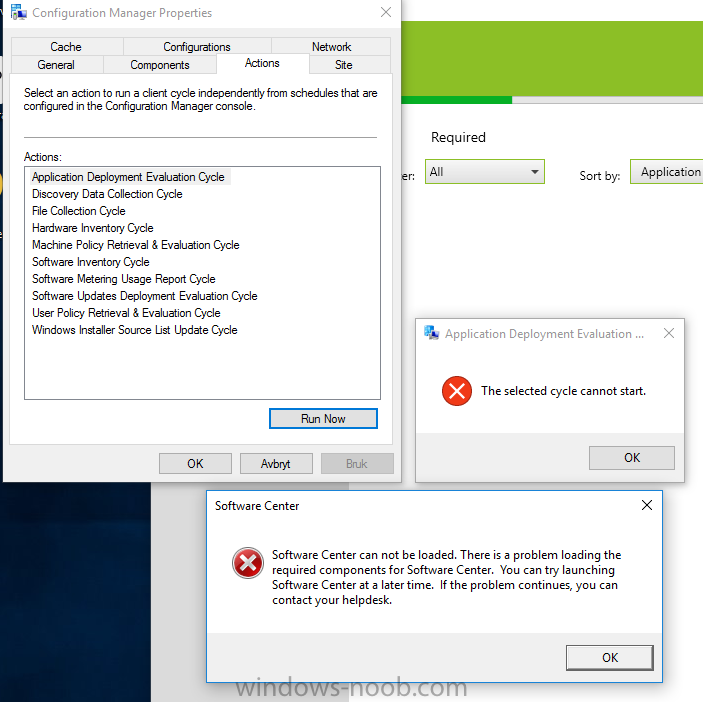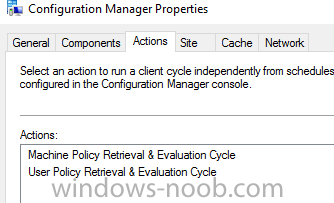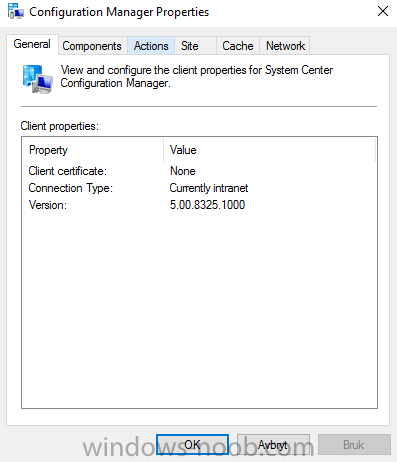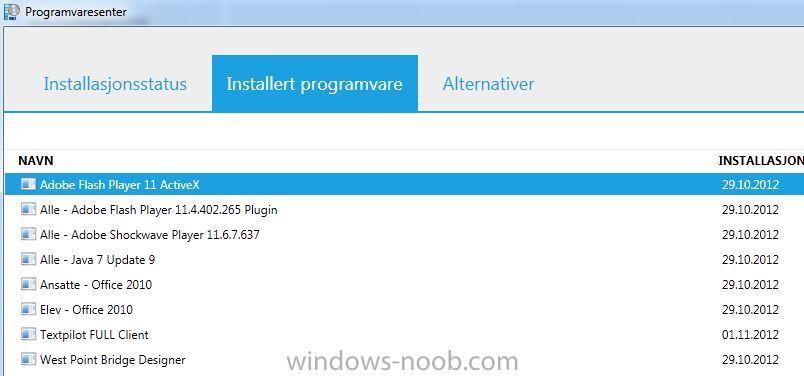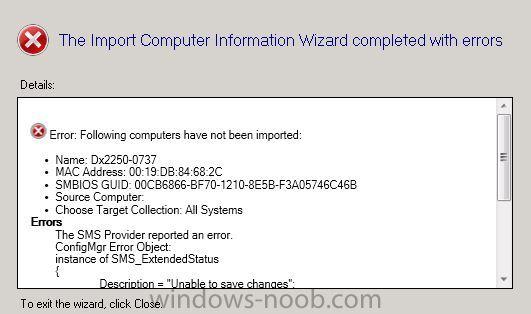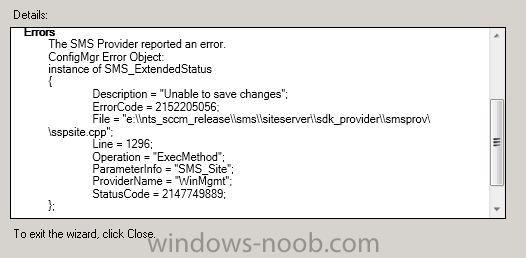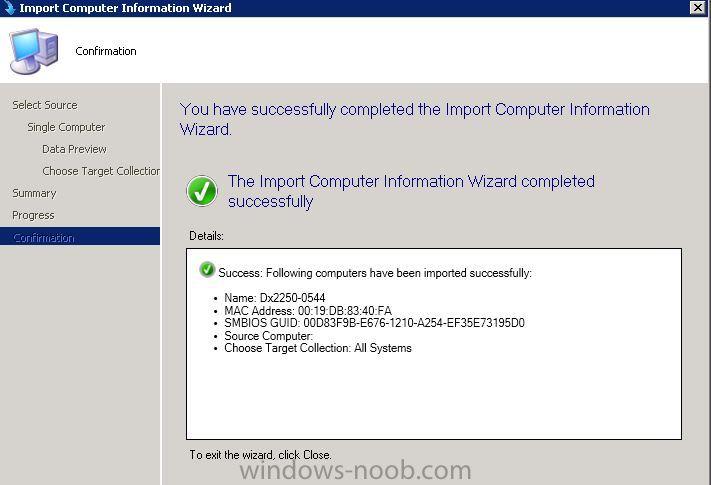
ABAdmin
Established Members-
Posts
29 -
Joined
-
Last visited
Everything posted by ABAdmin
-
SCCM clients rolling back components
ABAdmin replied to ABAdmin's topic in Configuration Manager 2012
I've gone through the configuration of the site to confirm that boundaries, groups and discovery are correct. I've confirmed that HTTP/80 is the preferred communication and that clients do not need to use HTTPS, SHA or encryption to communicate. Clients are able to ping and access the file shares of the MP. As a test, I disabled to the Windows firewall, but that did not help. At this point I believe the problem to be with the management point itself as clients are returning Code 0 on completion of the install. I believe the installation is correct and that the issue is with communication, and where it gets interesting is that the install string for the Client exe contains explicit SMS sitecode and MP settings for the EXE and MSI. Yet the LocationServices.log does not list the connected site. When accessing the client if I manually tell it to search - it finds the site automatically. Interesting development is that I can successfully deploy the Client to newly installed machines and they certify and communicate correctly. Machines are installed as vanilla and not from the April image of Windows 10. -
Hi, I am hoping someone here has had a similar issue or can at least point me in the right direction to get my clients installing completely with usable components. The environment: SCCM 2012 Current Branch 1606 (5.00.8412.1307) - installed on a single machine (small production environment) Client version on server (5.00.8412.1307) Client computers: Windows 10 - all machines were recently updated to Windows 10, some via a SCCM TS, others via a USB SCCM TS. In either case, the same image was used. The problem: Newly installed machines are not receiving a usable SCCM client. The CCM clients are reporting in to the MP, but if you attempt to run any action or component, or send any distribution to the machine - you receive a failure. Using Right Click Tools, I generate the "SCCM-error-RCT.jpg" message. If you run the action on the local client, I receive an "The selected cycle cannot start." popup. (SCCM-Client.png) First attempt to resolve is to repair the client - did not work. Reinstalling the client also did not work. Uninstalling, clearing the CCMsetup & SMS registry keys, rebooting and then reinstalling, did not work. Installing a lower client version (5.00.8325.1000) to force an update, did not work. Installs were down as push installs, as local EXE, as local MSI. All installs were with /forceinstall and predefined SMS site code and MP parameters. They were all accepted. In addition - performing the above actions caused a secondary problem: The CCM client is unable to complete its install. The base application installs, but components are not installed (Actions-tab.png & General-tab.png) Going through the logs (CCMSetup.log) I can see that the install is rolling back the installed components. My issue - I cannot see "why" its doing this. Is it rights based? - the client install account has the correct local admin access to the machines, and full access to the \Clients\ folder on the DP Does the system have the needed rights in AD? - yes - it has delegated control to system management and the schema was correctly extended Is the DNS correctly setup? - yes, Ip and names resolve to the correct MP Are Boundaries correct? - I am only using AD defined boundaries and yes, these are correct. Affected machines: 98% of all my machines. If anyone can give me some advice on where to look - I'd greatly appreciate it! Below is an excerpt from the last CCM client deployment to a test machine. Last trial was to install the older client (5.00.8325.1000) through Admin command prompt from a local source folder. ==========[ ccmsetup started in process 848 ]========== ccmsetup 21.09.2016 09.52.14 4208 (0x1070) Updated security on object C:\Windows\ccmsetup\cache\. ccmsetup 21.09.2016 09.52.14 4208 (0x1070) Launch from folder c:\Temp\Current Branch 2012 Client - no updates\ ccmsetup 21.09.2016 09.52.14 4208 (0x1070) CcmSetup version: 5.0.8325.1001 ccmsetup 21.09.2016 09.52.14 4208 (0x1070) Folder 'Microsoft\Microsoft\Configuration Manager' not found. Task does not exist. ccmsetup 21.09.2016 09.52.14 4208 (0x1070) Folder 'Microsoft\Microsoft\Configuration Manager' not found. Task does not exist. ccmsetup 21.09.2016 09.52.14 4208 (0x1070) Running on 'Microsoft Windows 10 Enterprise' (10.0.10586). Service Pack (0.0). SuiteMask = 272. Product Type = 18 ccmsetup 21.09.2016 09.52.14 4208 (0x1070) Ccmsetup command line: ccmsetup.exe /forceinstall SMSSITECODE=SiteCode SMSCACHESIZE=10000 SMSMP=SiteServer ccmsetup 21.09.2016 09.52.14 4208 (0x1070) Command line parameters for ccmsetup have been specified. No registry lookup for command line parameters is required. ccmsetup 21.09.2016 09.52.14 4208 (0x1070) Command line: ccmsetup.exe /forceinstall SMSSITECODE=SiteCode SMSCACHESIZE=10000 SMSMP=SiteServer ccmsetup 21.09.2016 09.52.14 4208 (0x1070) SslState value: 224 ccmsetup 21.09.2016 09.52.14 4208 (0x1070) No version of the client is currently detected. ccmsetup 21.09.2016 09.52.14 4208 (0x1070) Task 'Configuration Manager Client Retry Task' does not exist ccmsetup 21.09.2016 09.52.14 4208 (0x1070) Updated security on object C:\Windows\ccmsetup\. ccmsetup 21.09.2016 09.52.15 4208 (0x1070) Failed to get client version for sending state messages. Error 0x8004100e ccmsetup 21.09.2016 09.52.15 4208 (0x1070) Params to send '5.0.8325.1001 Deployment Error: 0x0, ' ccmsetup 21.09.2016 09.52.15 4208 (0x1070) A Fallback Status Point has not been specified and no client was installed. Message with STATEID='100' will not be sent. ccmsetup 21.09.2016 09.52.15 4208 (0x1070) Failed to send status 100. Error (87D00215) ccmsetup 21.09.2016 09.52.15 4208 (0x1070) Successfully deleted existing ccmsetup.exe ccmsetup 21.09.2016 09.52.16 4208 (0x1070) Downloading file c:\Temp\Current Branch 2012 Client - no updates\ccmsetup.exe ccmsetup 21.09.2016 09.52.16 4208 (0x1070) Downloading c:\Temp\Current Branch 2012 Client - no updates\ccmsetup.exe to C:\Windows\ccmsetup\ccmsetup.exe ccmsetup 21.09.2016 09.52.16 4208 (0x1070) File download 14% complete (262144 of 1790136 bytes). ccmsetup 21.09.2016 09.52.16 4208 (0x1070) File download 29% complete (524288 of 1790136 bytes). ccmsetup 21.09.2016 09.52.16 4208 (0x1070) File download 43% complete (786432 of 1790136 bytes). ccmsetup 21.09.2016 09.52.16 4208 (0x1070) File download 58% complete (1048576 of 1790136 bytes). ccmsetup 21.09.2016 09.52.16 4208 (0x1070) File download 73% complete (1310720 of 1790136 bytes). ccmsetup 21.09.2016 09.52.16 4208 (0x1070) File download 87% complete (1572864 of 1790136 bytes). ccmsetup 21.09.2016 09.52.16 4208 (0x1070) File download 100% complete (1790136 of 1790136 bytes). ccmsetup 21.09.2016 09.52.16 4208 (0x1070) Download complete. ccmsetup 21.09.2016 09.52.16 4208 (0x1070) Successfully created the ccmsetup service ccmsetup 21.09.2016 09.52.21 4208 (0x1070) ==========[ ccmsetup started in process 3376 ]========== ccmsetup 21.09.2016 09.52.22 4888 (0x1318) Updated security on object C:\Windows\ccmsetup\cache\. ccmsetup 21.09.2016 09.52.22 4888 (0x1318) Launch from folder C:\Windows\ccmsetup\ ccmsetup 21.09.2016 09.52.22 4888 (0x1318) CcmSetup version: 5.0.8325.1001 ccmsetup 21.09.2016 09.52.22 4888 (0x1318) Folder 'Microsoft\Microsoft\Configuration Manager' not found. Task does not exist. ccmsetup 21.09.2016 09.52.22 4888 (0x1318) Folder 'Microsoft\Microsoft\Configuration Manager' not found. Task does not exist. ccmsetup 21.09.2016 09.52.22 4888 (0x1318) Successfully started the ccmsetup service ccmsetup 21.09.2016 09.52.22 4208 (0x1070) In ServiceMain ccmsetup 21.09.2016 09.52.22 1588 (0x0634) Folder 'Microsoft\Microsoft\Configuration Manager' not found. Task does not exist. ccmsetup 21.09.2016 09.52.22 1588 (0x0634) Folder 'Microsoft\Microsoft\Configuration Manager' not found. Task does not exist. ccmsetup 21.09.2016 09.52.22 1588 (0x0634) Failed to connect to policy namespace. Error 0x8004100e ccmsetup 21.09.2016 09.52.22 4208 (0x1070) Failed to revoke client upgrade local policy. Error 0x8004100e ccmsetup 21.09.2016 09.52.22 4208 (0x1070) Deleted file C:\Windows\ccmsetup\ccmsetup.exe.download ccmsetup 21.09.2016 09.52.22 4208 (0x1070) Task 'Configuration Manager Client Upgrade Task' does not exist ccmsetup 21.09.2016 09.52.22 4208 (0x1070) CcmSetup is exiting with return code 0 ccmsetup 21.09.2016 09.52.22 4208 (0x1070) Running on 'Microsoft Windows 10 Enterprise' (10.0.10586). Service Pack (0.0). SuiteMask = 272. Product Type = 18 ccmsetup 21.09.2016 09.52.22 1588 (0x0634) Ccmsetup command line: "C:\Windows\ccmsetup\ccmsetup.exe" /runservice /source:"c:\Temp\Current Branch 2012 Client - no updates" "/forceinstall" "SMSSITECODE=SiteCode" "SMSCACHESIZE=10000" "SMSMP=SiteServer" ccmsetup 21.09.2016 09.52.22 1588 (0x0634) Command line parameters for ccmsetup have been specified. No registry lookup for command line parameters is required. ccmsetup 21.09.2016 09.52.22 1588 (0x0634) Command line: "C:\Windows\ccmsetup\ccmsetup.exe" /runservice /source:"c:\Temp\Current Branch 2012 Client - no updates" "/forceinstall" "SMSSITECODE=SiteCode" "SMSCACHESIZE=10000" "SMSMP=SiteServer" ccmsetup 21.09.2016 09.52.22 1588 (0x0634) SslState value: 224 ccmsetup 21.09.2016 09.52.22 1588 (0x0634) CCMHTTPPORT: 80 ccmsetup 21.09.2016 09.52.22 1588 (0x0634) CCMHTTPSPORT: 443 ccmsetup 21.09.2016 09.52.22 1588 (0x0634) CCMHTTPSSTATE: 224 ccmsetup 21.09.2016 09.52.22 1588 (0x0634) CCMHTTPSCERTNAME: ccmsetup 21.09.2016 09.52.22 1588 (0x0634) Lookup MP: SiteServer ccmsetup 21.09.2016 09.52.22 1588 (0x0634) FSP: ccmsetup 21.09.2016 09.52.22 1588 (0x0634) CCMFIRSTCERT: 1 ccmsetup 21.09.2016 09.52.22 1588 (0x0634) Config file: ccmsetup 21.09.2016 09.52.22 1588 (0x0634) Retry time: 10 minute(s) ccmsetup 21.09.2016 09.52.22 1588 (0x0634) MSI log file: C:\Windows\ccmsetup\Logs\client.msi.log ccmsetup 21.09.2016 09.52.22 1588 (0x0634) MSI properties: SMSSITECODE="SiteCode" SMSCACHESIZE="10000" SMSMP="SiteServer" CCMHTTPPORT="80" CCMHTTPSPORT="443" CCMHTTPSSTATE="224" SMSSLP="SiteServer" CCMFIRSTCERT="1" ccmsetup 21.09.2016 09.52.22 1588 (0x0634) Source List: ccmsetup 21.09.2016 09.52.22 1588 (0x0634) c:\Temp\Current Branch 2012 Client - no updates ccmsetup 21.09.2016 09.52.22 1588 (0x0634) MPs: ccmsetup 21.09.2016 09.52.22 1588 (0x0634) None ccmsetup 21.09.2016 09.52.22 1588 (0x0634) No version of the client is currently detected. ccmsetup 21.09.2016 09.52.22 1588 (0x0634) Task 'Configuration Manager Client Retry Task' does not exist ccmsetup 21.09.2016 09.52.22 1588 (0x0634) Updated security on object C:\Windows\ccmsetup\. ccmsetup 21.09.2016 09.52.22 1588 (0x0634) Failed to get client version for sending state messages. Error 0x8004100e ccmsetup 21.09.2016 09.52.22 1588 (0x0634) Params to send '5.0.8325.1001 Deployment Error: 0x0, ' ccmsetup 21.09.2016 09.52.22 1588 (0x0634) A Fallback Status Point has not been specified and no client was installed. Message with STATEID='100' will not be sent. ccmsetup 21.09.2016 09.52.22 1588 (0x0634) Failed to send status 100. Error (87D00215) ccmsetup 21.09.2016 09.52.22 1588 (0x0634) Detected 105754 MB free disk space on system drive. ccmsetup 21.09.2016 09.52.22 1588 (0x0634) Client OS Version 6.2 Service Pack 0.0 ccmsetup 21.09.2016 09.52.22 1588 (0x0634) Failed to get UWF_Filter instance. UWF Feature not installed. HRESULT=0x80041010 ccmsetup 21.09.2016 09.52.22 1588 (0x0634) Running as user "SYSTEM" ccmsetup 21.09.2016 09.52.22 1588 (0x0634) Checking Write Filter Status. ccmsetup 21.09.2016 09.52.22 1588 (0x0634) This is not a supported write filter device. We are not in a write filter maintenance mode. ccmsetup 21.09.2016 09.52.22 1588 (0x0634) Performing AD query: '(&(ObjectCategory=mSSMSManagementPoint)(mSSMSDefaultMP=TRUE)(mSSMSSiteCode=SiteCode))' ccmsetup 21.09.2016 09.52.23 1588 (0x0634) OperationalXml '<ClientOperationalSettings><Version>5.00.8412.1307</Version><SecurityConfiguration><SecurityModeMask>0</SecurityModeMask><SecurityModeMaskEx>224</SecurityModeMaskEx><HTTPPort>80</HTTPPort><HTTPSPort>443</HTTPSPort><CertificateStoreName></CertificateStoreName><CertificateIssuers></CertificateIssuers><CertificateSelectionCriteria></CertificateSelectionCriteria><CertificateSelectFirstFlag>1</CertificateSelectFirstFlag><SiteSigningCert>308202EF308201D7A00302010202105A31A88AAEF19AB84601CE2604217FB7300D06092A864886F70D01010B05003016311430120603550403130B53697465205365727665723020170D3136303630313037333534355A180F32313136303530393037333534355A3016311430120603550403130B536974652053657276657230820122300D06092A864886F70D01010105000382010F003082010A0282010100DBA6E68CE03ADCF273A8B20BA8729C367C14904FAEBCC6C8A7DFDDAF41EBE1D277F53625B776C88DFA0A95AA4CF1354978F2F3CF6F2F78753A91D156849C20548BEA51EBC9DD40CFE626F998AD64E5AD35057C5FF61FA0E52616E6EC3A2C4EF8BE3EC720189AE891AE8623B017CF714915E559A5B347E1B9006B962DFCDEB594B1D8E2C4339DF581243D68A901A0860A2016F515D60F8BD199188FB0699394C56D84F20275AADE1105AAA55E1093004A557CCD569FF22CA34F926DAD1B196603A263A1E1CED9BA8383CC8A99EB8A001956A78E8649371905269BD17E0DFD183319C1B2220E6E97C29EE228577A49CCD980EC09849A134123585469071B6BEF6D0203010001A3373035301D0603551D110416301482126B672D7363636D30312E6B672E6C6F63616C30140603551D25040D300B06092B060104018237650B300D06092A864886F70D01010B0500038201010046359CD1D5D90C32640FA5FEA36238A92F68DF6DA6A3ED3CCB2F9D250E7E2CA57ACBA317D3C5EB7EC7E4BD4410B60E5A7BFF1944B267FF08668580D2A7B9F524F74F27197856D939A6CF958A707DAECB2D31AD1F2F765F125B3C19DC92EF44D033F0AD490BBCF2A56734A6FD1926F8F2B5EF0F6D7DE1107505CD27CCF97EE02EA00D5C24106C2254F63269D654789E58ED61440347C67E77C08BE8AF1C298CA82558E81D6136A43B83402215C4AAC1B081E4C08025E6C266F9AD804932C94233E0B9DC19872A4EEC3E990349FEE01840AB46ADDA36EC19EFA07499F158E0CEAF4C370AEB8B2F8BF9DF1355BA920DB3DDB77DDEE1C0B486B1B92C6BFC44EE99A4</SiteSigningCert></SecurityConfiguration><RootSiteCode>SiteCode</RootSiteCode><CCM> <CommandLine>SMSSITECODE=SiteCode SMSCACHESIZE=10000 SMSMP=SiteServer</CommandLine> </CCM><FSP> <FSPServer></FSPServer> </FSP><Capabilities SchemaVersion ="1.0"><Property Name="SSLState" Value="0" /></Capabilities><Domain Value="kg.local" /><Forest Value="kg.local" /></ClientOperationalSettings>' ccmsetup 21.09.2016 09.52.23 1588 (0x0634) Unable to open Registry key Software\Microsoft\CCM. Return Code [80070002]. Client HTTPS state is Unknown. ccmsetup 21.09.2016 09.52.23 1588 (0x0634) The MP name retrieved is 'SiteServer' with version '8412' and capabilities '<Capabilities SchemaVersion="1.0"><Property Name="SSLState" Value="0"/></Capabilities>' ccmsetup 21.09.2016 09.52.23 1588 (0x0634) MP 'SiteServer' is compatible ccmsetup 21.09.2016 09.52.23 1588 (0x0634) Retrieved 1 MP records from AD for site 'SiteCode' ccmsetup 21.09.2016 09.52.23 1588 (0x0634) Retrived site version '5.00.8412.1307' from AD for site 'SiteCode' ccmsetup 21.09.2016 09.52.23 1588 (0x0634) SiteCode: SiteCode ccmsetup 21.09.2016 09.52.23 1588 (0x0634) SiteVersion: 5.00.8412.1307 ccmsetup 21.09.2016 09.52.23 1588 (0x0634) No MPs were specified from commandline or the mobileclient.tcf. ccmsetup 21.09.2016 09.52.23 1588 (0x0634) Downloading file ccmsetup.cab ccmsetup 21.09.2016 09.52.23 1588 (0x0634) Determining source location... ccmsetup 21.09.2016 09.52.23 1588 (0x0634) Found accessible source: c:\Temp\Current Branch 2012 Client - no updates ccmsetup 21.09.2016 09.52.23 1588 (0x0634) Found available source c:\Temp\Current Branch 2012 Client - no updates\ ccmsetup 21.09.2016 09.52.23 1588 (0x0634) Downloading c:\Temp\Current Branch 2012 Client - no updates\ccmsetup.cab to C:\Windows\ccmsetup\ccmsetup.cab ccmsetup 21.09.2016 09.52.23 1588 (0x0634) File download 100% complete (9745 of 9745 bytes). ccmsetup 21.09.2016 09.52.23 1588 (0x0634) Deleted file C:\Windows\ccmsetup\ccmsetup.cab ccmsetup 21.09.2016 09.52.23 1588 (0x0634) Download complete. ccmsetup 21.09.2016 09.52.23 1588 (0x0634) Ccmsetup.cab manifest has been changed. Force to download client.msi and necessary pre-reqs again. ccmsetup 21.09.2016 09.52.23 1588 (0x0634) C:\Windows\ccmsetup\ccmsetup.cab is Microsoft trusted. ccmsetup 21.09.2016 09.52.23 1588 (0x0634) Successfully extracted manifest file C:\Windows\ccmsetup\ccmsetup.xml from file C:\Windows\ccmsetup\ccmsetup.cab. ccmsetup 21.09.2016 09.52.23 1588 (0x0634) Loading manifest file: C:\Windows\ccmsetup\ccmsetup.xml ccmsetup 21.09.2016 09.52.23 1588 (0x0634) Successfully loaded ccmsetup manifest file. ccmsetup 21.09.2016 09.52.23 1588 (0x0634) Checking if manifest version '5.00.8325.1000' is newer than the ccmsetup version '5.0.8325.1001' ccmsetup 21.09.2016 09.52.23 1588 (0x0634) Running from temp downloaded folder or manifest is not newer than ccmsetup. ccmsetup 21.09.2016 09.52.23 1588 (0x0634) Item 'i386/vcredist_x86.exe' is applicable. Add to the list. ccmsetup 21.09.2016 09.52.23 1588 (0x0634) Item 'x64/vcredist_x64.exe' is applicable. Add to the list. ccmsetup 21.09.2016 09.52.23 1588 (0x0634) Item 'i386/vc50727_x86.exe' is not applicable. ccmsetup 21.09.2016 09.52.23 1588 (0x0634) Item 'x64/vc50727_x64.exe' is applicable. Add to the list. ccmsetup 21.09.2016 09.52.23 1588 (0x0634) Item 'i386/WindowsUpdateAgent30-x86.exe' is not applicable. ccmsetup 21.09.2016 09.52.23 1588 (0x0634) Item 'x64/WindowsUpdateAgent30-x64.exe' is not applicable. ccmsetup 21.09.2016 09.52.23 1588 (0x0634) Item 'i386/msxml6.msi' is not applicable. ccmsetup 21.09.2016 09.52.23 1588 (0x0634) Item 'x64/msxml6_x64.msi' is applicable. Add to the list. ccmsetup 21.09.2016 09.52.23 1588 (0x0634) Item 'i386/msrdcoob_x86.exe' is not applicable. ccmsetup 21.09.2016 09.52.23 1588 (0x0634) Item 'x64/msrdcoob_amd64.exe' is not applicable. ccmsetup 21.09.2016 09.52.23 1588 (0x0634) Item 'pkgmgr.exe' is not applicable. ccmsetup 21.09.2016 09.52.23 1588 (0x0634) Item 'dism.exe' is applicable. Add to the list. ccmsetup 21.09.2016 09.52.23 1588 (0x0634) Item 'wimgapi.msi' is not applicable. ccmsetup 21.09.2016 09.52.23 1588 (0x0634) Item 'i386/MicrosoftPolicyPlatformSetup.msi' is not applicable. ccmsetup 21.09.2016 09.52.23 1588 (0x0634) Item 'x64/MicrosoftPolicyPlatformSetup.msi' is applicable. Add to the list. ccmsetup 21.09.2016 09.52.23 1588 (0x0634) Item 'i386/WindowsFirewallConfigurationProvider.msi' is not applicable. ccmsetup 21.09.2016 09.52.23 1588 (0x0634) Item 'x64/WindowsFirewallConfigurationProvider.msi' is applicable. Add to the list. ccmsetup 21.09.2016 09.52.23 1588 (0x0634) Item 'i386/Silverlight.exe' is applicable. Add to the list. ccmsetup 21.09.2016 09.52.23 1588 (0x0634) Item 'i386/wic_x86_enu.exe' is not applicable. ccmsetup 21.09.2016 09.52.23 1588 (0x0634) Item 'x64/wic_x64_enu.exe' is not applicable. ccmsetup 21.09.2016 09.52.23 1588 (0x0634) Item 'i386/NDP452-KB2901907-x86-x64-AllOS-ENU.exe' is applicable. Add to the list. ccmsetup 21.09.2016 09.52.23 1588 (0x0634) Item 'SCEPInstall.exe' is applicable. Add to the list. ccmsetup 21.09.2016 09.52.23 1588 (0x0634) Item 'i386/client.msi' is not applicable. ccmsetup 21.09.2016 09.52.23 1588 (0x0634) Item 'x64/client.msi' is applicable. Add to the list. ccmsetup 21.09.2016 09.52.23 1588 (0x0634) Default CSP is Microsoft Enhanced RSA and AES Cryptographic Provider ccmsetup 21.09.2016 09.52.23 1588 (0x0634) Default CSP Type is 24 ccmsetup 21.09.2016 09.52.23 1588 (0x0634) Discovering whether item 'i386/vcredist_x86.exe' exists. ccmsetup 21.09.2016 09.52.23 1588 (0x0634) Detected item 'i386/vcredist_x86.exe' ccmsetup 21.09.2016 09.52.23 1588 (0x0634) Discovering whether item 'x64/vcredist_x64.exe' exists. ccmsetup 21.09.2016 09.52.23 1588 (0x0634) Detected item 'x64/vcredist_x64.exe' ccmsetup 21.09.2016 09.52.23 1588 (0x0634) Discovering whether item 'x64/vc50727_x64.exe' exists. ccmsetup 21.09.2016 09.52.23 1588 (0x0634) Upgrade code '{A8D19029-8E5C-4E22-801
-
And now I remember - the 0x80070005 is also tied to anonymous access. I had that when trying to deploy application updates through the Software Centre client. When the access was not enabled I would get a popup with that error msg. The same setting for "Allow clients to connect anonymously" should resolve it for you. Looking at your other error, the literature seems to indicate it may be a spelling\naming error ( "https://social.technet.microsoft.com/Forums/systemcenter/en-US/45683766-2370-41f5-b2a0-87bd16984664/sccm-problem-task-sequence-install-software" ) Perhaps this will help...?
-
Hei, For the Errors: 0x80041002 & 0x80070005 I have not encountered these before, but will look around and see what I have. But for the final error: 0x80070002 - I have had this before and it stemmed from a rights issue. Basically the machine client was not authenticated to access the TS. I had to enable "Anonymous Access" and then my (new\unknown) machines could see the relevant TS during PXE deployments. Setting is here: Did not have "Allow Anonymous Access" enabled. Enabled it and OSD TS worked. Typical. To enable: Administration > Distribution Points > Properties > General tab > "Allow clients to connect anonymously"
-
SCCM 2012 Build and Capture error
ABAdmin replied to Shatners_wig's topic in Configuration Manager 2012
hei, Never had that error. Have had (0x80070032) but that was for a partitioning error in my target client. VMs are one of the easiest clients to capture...if everything goes right! ;-) What is the sequence of events that you are doing? What are your logs telling you? Can you give some more contextual information? -
If you access the share on the SCCM server (should be "\\SCCMServer\SMS_<SiteCode>") one of the available folders will be Client. From here, just run the ccmsetup.exe and it will install the correct client version onto your target pc. If its to only install one or two machines, then accessing from here is ok. But if you need to distribute the client to many machines, you can use a GPO that forces an install at start on all the machines. Set the GPO to run once so that you do not force an install of the client at every pc start.
-
Hei, Have had this error before and found two possible solutions. 1 is here: http://social.technet.microsoft.com/Forums/systemcenter/en-US/0c957eaa-b600-4fc5-b620-f7219a048b52/os-deployment-failed-to-get-client-identity-80004005 The other was the BIOS clock of the target pc. The target had an incorrect date\time to the server and so could not autthenticate. Changed the clock to be closer and all was well. But are you sure on the error code? Looking at your logs, the error here is 80072EE7 and points to a HTTP error. Looking at the first error line, it would seem that the client cannot find the server. Are you sure the server address resolves both on IP and when doing a DNS lookup? Did a quick search and found this: "http://social.technet.microsoft.com/Forums/systemcenter/en-US/08ceb876-9c00-40e3-a5df-f5985783162c/sccm-client-installsending-with-winhttp-failed-80072ee7" Maybe checking your FQDN would be a good starting point... Good luck!
-
Migrate SCCM 2012 SP1 to new 2012 server
ABAdmin replied to ABAdmin's topic in Configuration Manager 2012
Thanks Paul. I am leaning towards a full rebuild for the SCCM infrastructure, SQL server included, but finding the best option based on other's experience would be helpful.- 3 replies
-
- migratesccm
- 2012
- (and 6 more)
-
Morning, I have the opportunity to upgrade my SCCM 2012 SP1 server base OS to Server 2012. In addition, I now have the capacity to spread the load of the SCCM server across multiple SCCM servers. But before I dive in, I would like to know a few things that do not seem to be well documented. Has anyone tried to Upgrade a Server 2008 R2 to a Server 2012, with said server being an SCCM 2012 server? What were Your results\impressions? Would it be better to setup new servers instead? I aim to spread the various SCCM functions over several machines (until now, 1 server has been doing ALL the SCCM tasks) I know its possible to export the Task Sequences, but is it possible to export the Device and User lists from one SCCM to another? How would this affect the SCCM Clients? Can the backup data be used for this? My goal is to have 1 main server With the main roles, a Distribution/Update server, a Reporting & Catalog server and then the Fallback server. All will be running Server 2012. This is one site with a Device and user Count of 2000. Cheers and thanks in advance! Anthony
- 3 replies
-
- migratesccm
- 2012
- (and 6 more)
-
Wonderful stuff...and right before quitting time too! Managed to get the distribution service working again as it should... What I did: 1. Removed all failed\in progress distributions & content locations 2. Backup up server 3. Remove distribution role from server 4. Reapply distribution role 5. Distribute content 6. Deploy content And it works. Its questionable if all that is required is the reapplication of the distribution point, but I am not going to try that from the backup. Also, I have not yet tested the PXE service...but I'll leave this til after the long weekend. Was interesting: Looking at the distmgr.log it seems as if the packages were getting ready to be distributed, and succeeding, but yet the server itself could not complete that. Now it does.
- 3 replies
-
- kb2817245sp1
- cu1
-
(and 5 more)
Tagged with:
-
One dp - combined with the main SCCM server. Going through each individual object in each category under Software Library and am removing all distributions that are either "in progress" or "failed". Once done going to redistribute some to see if they go through.
- 3 replies
-
- kb2817245sp1
- cu1
-
(and 5 more)
Tagged with:
-
Should I cut my losses and rebuild all my libraries? Some Background: Over the past week I have been trying to redistribute and validate all packages, applications and OSDs to our SCCM server. The reason for this is that one of the hdd for the server was relocated from one virtual datastore to another. Unfortunately we discovered after the fact that SCCM could no longer validate the hash of any of the packages - each and everyone was listed as unavailable. I set about redistributing them and validating them, but now I am faced with the situation that the process to validate\redistribute is hanging and not completing the job. Looking at the resource logs for the server I can see it is accessing the hdd at a high rate, but within tolerable limits. And aside from that, no other server resource is been unduly stressed or used. But at the same time, no packages, images, OSDs are getting validated or distributed. They all display "in progress". And have done so for several days now. And now for the complication that is the CU1 KB2817245 hotfix - this was unfortunately applied yesterday and we are unsure if it is the cause of the PXE not been able to distribute OSD TS or if that issue is tied to the "in progress" waiting. Leading me to either think I should cut my losses and to save time rebuild my entire catalogue. Or should I try and troubleshoot it some more...but then where should I start? Organisation info: We are a school with a single SCCM 2012 server in an 2008 R2 environment. All clients are managed with ConfigMngr. We make exclusive use of Windows 7 in a 40/60 split between x64 and x32 versions. Any info\help is appreciated.
- 3 replies
-
- kb2817245sp1
- cu1
-
(and 5 more)
Tagged with:
-
OSD: WinPe resets at network driver load repeatedly
ABAdmin replied to ABAdmin's topic in Configuration Manager 2012
Got it working! Found the solution here: "http://social.technet.microsoft.com/Forums/en-US/configmgrosd/thread/6a25e331-2705-4cba-bf2c-bb7d9f16ebef/" The Bios clock was wrong. Checked mine and sure enough - the clock was set to 4 May 2007. Setting it to the correct date fixed the issue! Machine is now loading in the OS. -
OSD: WinPe resets at network driver load repeatedly
ABAdmin replied to ABAdmin's topic in Configuration Manager 2012
Update: Ok, on some advice from a guru I deleted all my boot images except the two defualt original images. Refreshed these to the distribution point and then ran an OSD TS. And guess what, all the client types that had been giving me issues before (and which I had treated as seperate items) booted up the TS and loaded the OS completely. All except this dx2250...which might soon become an airborne variant. The OSD TS was tested against the following: VMware Lenovo L520 Lenovo M90p Lenovo M91p Dell D531 HP 6710b HP dx2250 I managed to ge the debug DOS prompt to load before the reboot on the dx2250 and found a very strange error: "Failed to get client identity (80004005) TSPxe" Some googling turned up a possible solution: Reboot the SCCM server (http://social.techne...20-f7219a048b52) But this didnt help me though. The dx2250 still wont take the image. Attached is the smsts.log file: smsts.log Sooooo....any suggestions? This has gone over from a "need" to find a solution to a "i'm not gonna cop out now". -
OSD: WinPe resets at network driver load repeatedly
ABAdmin replied to ABAdmin's topic in Configuration Manager 2012
Quite possible in this case - its only one client left. But it also defeats the aim of letting SCCM do all the work. This same solution will be used for my other distributed clients. And I do not look forward to going round to them all. As an additional twist: I deleted unneeded Boot images and then refreshed the ones I wanted to keep. While I couldnt update to the same dx2250 client, I could do an OSD to clean VMs. Question: Is it possible for drivers that had previously been loaded into the boot image to get coorrupted? -
OSD: WinPe resets at network driver load repeatedly
ABAdmin replied to ABAdmin's topic in Configuration Manager 2012
No-one got any tips? -
Hei all, I am having a truly strange experience with our SCCM2012 server and a OSD to some desktops. Now, if I had just started with them I would have thought that I had the incorrect driver, but thats not the case here. About a month back I started to configure replacement client desktops for the students. These machines would be going to the library, an intense environment for data. So to make things simple for myself, I took some old HP dx2250 Athlon pc's, installed a new PCI Wifi card and imaged them from SCCM with Win7 x32. I have completed all of them, no problem. I then decided to expand on the usable machines and place several more in the common areas. First batch went well. But the second batch hit a hitch. When they were loading the WinPE environment, they repeatedly rebooted when the network drivers were been loaded. The machines are IDENTICAL in every way to the ones that had been imaged before. I tried booting them on different vlans, but the same issue happened on all. Finally I took one of them over to my work office to troubleshoot it and low and behold - it worked. I did no changes, just booted it from a different physical location. The vlans here are the same as in their previous location. And now things go really weird. I brought over the last 3 and two of them did the same as the first. But not the last. No matter what I try, I cannot get the WinPE environment to load past the network driver load. As mentioned before, the machine is identical to all the others that have been successful. Are there any logs that I can check to follow up or do any of you have any tips for me? Cheers & thanks in advance! Anthony
-
Morning, I'm hoping one of you bright sparks can help me figure out which simple switch or option I have not activated to make this work. The issue: The Application Catalogue hosted on the SCCM 2012 server is not displaying any results for ANY applications, even though the local Client has the correct deployed list of applications and is functioning correctly. Users are able to launch installations from the local client. Looking at the settings on the server it looks correct for standard HTTP traffic and the server is requesting login credentials when users try to access the online catalogue (which is correct - the environment is a school and I do not want students to access the catalogue unneccessarily) Included are some screenshots since pictures are a 1001 words worth! Cheers, Anthony
- 3 replies
-
- program catalogue
- application server
-
(and 2 more)
Tagged with:
-
Thanks for that - In the end I deleted the server and reinstalled everything, now its working mostly correctly.
- 13 replies
-
- sccm 2012
- configuration manager
- (and 8 more)
-
Have had the same issues when deploying the OS with included Applications. One workaround that does work is that I have the clients join a Prestage OU in AD and within SCCM these clients are all part of a specific group. Once the client has installed the OS I have a Required task sequence with all the needed applications waiting for the client to download and install. Once complete, I move the client out of the group and the OU to it's correct location and proceed with the next group. This is not the ideal solution that I would like to use, but as the ideal is failing continuously, this works as a bandaid.
-
Auto restart during OS deploy\capture from DP with PXE
ABAdmin replied to ABAdmin's topic in Configuration Manager 2012
To close this topic: Seems that the SCCM 2012 RC2 was buggy - have now installed RTM and it is PXE'ing beautifully!- 2 replies
-
- distribution point
- dp
-
(and 8 more)
Tagged with:
-
Unable to import test PC...MAC issue?
ABAdmin replied to ABAdmin's topic in Configuration Manager 2012
Found a workaround: The pc in question still had W7 installed from a previous test, so I could manually install the CCM client and then after the needed records had updated - it was once more in SCCM! But, still curious as to why it gave that error when importing...any suggestions? -
Hi, I am having issues trying to import one of my test clients into SCCM 2012 RTM. I have been using this physical machine repeatedly to test against the OS deployment\capture sequences within SCCM. Until now I could import the device via a single computer or file based import using MAC &\or GUID, but now it keeps returning ErrorCode=2152205056 with description "unable to save changes". I think the error is related to a MAC recorded in the SQL database that is not getting deleted correctly when I delete the device from within SCCM, but I cannot confirm this as SQL is completely unknown to me. I know it is not a question of rights, as I can still import other devices, delete the import and then reimport them. Does anyone have any idea of how to check this from within SCCM or perhaps via a SQL query? Cheers & thanks in advance, AB
-
Hi, I am having a very strange error crop up while testing the deploy and capture of a boot OS via a task sequence. The error occurs on x86 or x64, on VM's or physical clients. SCCM 2012 is installed per the fantastic tutorial here and this error is appearing on part 7. When deploying the boot image to the target pc, the PE environment loads and immediately resets the client pc with this error: Failed to run task sequence - An error occurred while retrieving policy for this computer (0x80004005) After some searching around I found and tried these: Link 1: Permissions & Link 2: Certificates Unfortunately, neither helped. I have granted sufficient permissions to client systems to access the boot.wim image and the only certificate available is loaded into SCCM and is unblocked. Its difficult to be 100% sure re the certificates issue, as that link is to a 2007 SCCM structure and I think that Admin.\Security\Certificates would be the corresponding location in 2012. At this point I have reinstalled the distribution point, setup new boot images for both x86 & x64, created new tasks and sent them out to the clients and still ... nothing. Clients are still restarting immediately after the PE loads. I have tried to look at the smsts.log on the clients, but they are listed as empty, so cannot. The smspxe.log file reports business as usual with no unusual\error based behaviour. Any ideas anyone or anyWeb? At this point I am at my wits end, but need to continue regardless... Cheers & Thanks
- 2 replies
-
- distribution point
- dp
-
(and 8 more)
Tagged with:



